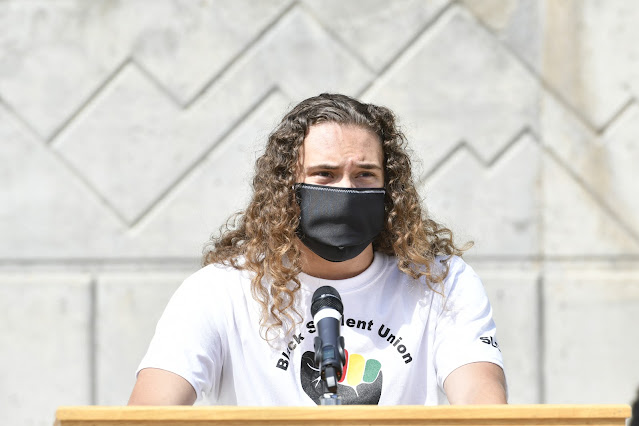Fueled by hope – or perhaps, prisoners of hope, to paraphrase Dr. Cornel West – in the belief that impactful, lasting change can be brought to the subject of racial injustice, students, staff and faculty at Salt Lake Community College gathered to hear and share ideas of what can be done to tip the scales.
The SLCC Black Student Union (BSU) dubbed their event, “The Time is Now: Let’s Talk About Racial Injustices,” assembling at the college’s Taylorsville Redwood Campus. With media attention more focused on the pandemic and less on the continuing peaceful protests around the country, the gathering was also about timing and momentum.
“We thought that putting off this event to a later time is not the right thing to do right now,” said BSU President Jaycee Galvin. “We figure now is the time to raise our voices and be heard.”
With face coverings at the ready, everyone properly social distancing and the smell of hand sanitizer in the air, many took turns at the microphones inside the Alder Amphitheatre on a hot June afternoon, beginning with Weber State University student Terri Hughes’ singing of the Black National Anthem “Lift Every Voice and Sing”. Dr. Roderic Land, dean of the SLCC School of Humanities and Social Sciences, said in prayer that we are living in turbulent times with so much hate, vitriol and anger, and he called on God to heal a broken nation, world and collective spirit.
As an academic, Dr. Land took the audience through a scholarly review of the Civil War, noting that the battle ended in 1865 but that the war continues to this day in the form of state-sponsored racial discrimination, the mistreatment of Blacks by law enforcement, inequities in education and court decisions that stripped Black people of rights.
“The war is not over – it has never been over,” Dr. Land said. “You cannot sit silent on the sidelines – you have to act.” He called on those in the audience to aspire for better things, to be courageous to make those things happen, find a unified front, figure out where to insert yourself into the battles you choose to fight and have the tenacity to follow through.
Utah’s first African American woman to serve in the State Legislature, Sandra Hollins, who represents House District 23, urged everyone to “get involved” in some way. “Don’t give up – please, do not give up,” she said. “A lot of you have been on the front lines, pushing forward. You may feel discouraged. But this is along process. There is nothing that will change overnight. But I guarantee it will change if we don’t give up.”
Ms. Hollins encouraged everyone to vote and highlighted two accomplishments in the political arena: the passing in 2016 of a bill she sponsored to establish a Juneteenth holiday observance in Utah (third Saturday of each June) and the more recent legislation to ban the use of a knee on the throat by law enforcement in Utah. She called on more reform in education and healthcare, as well as law enforcement, to ensure equality in each of those areas.
An ebullient Betty Sawyer, a BSU advisor at Weber State University and president of the Ogden chapter of the NAACP, started out by leading the crowd in singing part of Bob Marley’s “Get up, Stand up”. The youngest of six children, Ms. Sawyer talked about being born into the journey of civil rights. Recalling Maya Angelou’s words, she said, “We are the dreams and hopes of the slave,” telling the audience directly that learning from history allows us to go forth and manifest our greatness. “You come from greatness. You are great. And you’re destined to do great things if you haven’t already. The fact you are here, you have already started your journey. I’m just here to remind you of the awesome work you’re going to do. … It’s your time now.”
Ms. Sawyer talked about the need for more focus on African American history in this country, growing diverse networks to embolden like-minded people along the journey and being committed to a cause, using the example of the four Black men who famously protested in the early 1960s against not being served at a lunch counter in Greensboro, North Carolina. That protest spread to more similar protests that lasted for years throughout the south and eventually resulted in change. “How many of you are willing to be out there for five years,” Ms. Sawyer asked. “Change takes time.”
BSU members held a Q&A between audience members and the event’s speakers after BSU Vice President Musafiri Chikobe and BSU Treasurer Yasmin Muhamud read the names of Black people killed by law enforcement, punctuating a moment of silence lasting about eight minutes, the same amount of time a police officer kept a knee on the throat of George Floyd in Minnesota. “All lives matter cannot matter until Black lives matter,” BSU Outreach Chair Wisdom Agbabli said to applause from the crowd. “Being born Black in this country is not a choice.” You can’t change it, he added, like you can a career or major in college. “Being born Black, you can’t change your skin color and everything that comes with it.”










Comments
Post a Comment